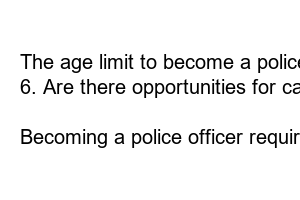경찰이 되는 방법
Title: A Step-by-Step Guide on How to Become a Police Officer
Introduction:
Are you passionate about serving and protecting your community? Becoming a police officer can be a fulfilling career choice, allowing you to make a positive impact and maintain law and order. In this blog post, we will guide you through the process of becoming a police officer, providing valuable insights and useful tips to help you on your journey.
1. Meet the Basic Requirements:
To pursue a career in law enforcement, you must meet certain criteria, including being at least 21 years old, possessing a high school diploma or GED, and having a valid driver’s license. Additionally, you should have a clean criminal record and be in good physical and mental health. *Meeting the basic requirements is the first step towards joining the police force.*
2. Obtain a Relevant Education:
While a college degree is not always mandatory, having one can enhance your candidacy for a police officer position and open up advancement opportunities. Consider earning a degree in criminal justice, criminology, or a related field to gain a deeper understanding of law enforcement principles, theories, and practices. *Seeking a relevant education can differentiate you from other applicants.*
3. Complete Police Academy Training:
Upon being hired by a police department, you will enter a rigorous training program at the police academy. This training typically lasts several months and covers various aspects of law enforcement, including self-defense techniques, firearm training, emergency response protocols, and ethical decision-making. *Completion of police academy training is crucial to prepare you for the challenges of police work.*
4. Pass Background Checks and Examinations:
Aspiring police officers undergo extensive background checks, including polygraph tests, fingerprinting, and comprehensive interviews, ensuring your suitability for a career in law enforcement. You will also need to pass written exams assessing your knowledge of law enforcement procedures, first aid, and more. *Passing background checks and examinations proves your trustworthiness and competency.*
5. Gain Field Experience:
To increase your chances of successful recruitment, consider gaining field experience through internships, volunteer positions, or auxiliary police work while still in school or during the application process. These opportunities provide valuable insights into police work, while also demonstrating your commitment and dedication to the profession. *Field experience sets you apart from other candidates and reinforces your commitment to law enforcement.*
6. Nail the Interview and Physical Fitness Tests:
The final stages of the hiring process often involve an interview, where you must demonstrate your interpersonal skills, problem-solving abilities, and commitment to public service. Additionally, physical fitness tests assess your strength, endurance, and agility. Ensure you are mentally and physically prepared to excel in these assessments. *Acing the interview and physical fitness tests will secure your position as a police officer.*
FAQs:
1. How long does it take to become a police officer?
The duration can vary but generally takes around six months to a year, depending on the hiring process and academy training.
2. Can I become a police officer with a criminal record?
Having a criminal record may disqualify you from being a police officer, but it depends on the nature and severity of the offense.
3. Is a college degree required to become a police officer?
While not always mandatory, having a college degree can boost your chances of employment and advancement in the field.
4. What are the typical job responsibilities of a police officer?
Job responsibilities include patrolling assigned areas, responding to emergencies, conducting investigations, enforcing laws, and maintaining public order and safety.
5. Is there an age limit to become a police officer?
The age limit to become a police officer varies by jurisdiction, but most require applicants to be at least 21 years old.
6. Are there opportunities for career advancement in law enforcement?
Yes, there are various opportunities for career advancement in law enforcement, including promotions to supervisory positions, detective roles, or specialized units such as K-9 or SWAT teams.
Summary:
Becoming a police officer requires meeting basic requirements, obtaining relevant education, completing police academy training, passing background checks and examinations, gaining field experience, and excelling in interviews and physical fitness tests. By following this step-by-step guide, you can pave your way towards a rewarding career in law enforcement, serving and protecting your community.

